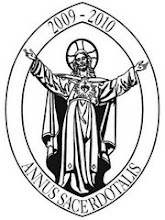Here's an interesting (though sad) story, from the New Oxford Review, of the descent of two Catholic nuns into the culture of death, via their espousal of radical feminism and its insistence on 'Women's Experience' as a source for interpreting moral value.The former nuns even wrote a book about their experiences, titled:
'No Turning Back: Two Nuns Battle with the Vatican over Women's Right to Choose' (1990).
In 1985, the Ratzinger Report was published in which the Holy Father, then Cardinal Ratzinger, offered perceptive insights into the problem of radical feminism.
Below are some quotations:
"The interchangeableness of the sexes, viewed as simple "roles" determined more by history than by nature, and the trivialization of male and female extend to the very idea of God and from there spread out to the whole religious reality.
Christianity is not "our" work; it is a Revelation; it is a message that has been consigned to us, and we have no right to reconstruct it as we like or choose. Consequently, we are not authorized to change the Our Father into an Our Mother: the symbolism employed by Jesus is irreversible; it is based on the same Man-God relationship that he came to reveal to us. Even less is it permissible to replace Christ with another figure. But what radical feminism - at times even that which asserts that it is based on Christianity - is not prepared to accept as precisely this: the exemplary, universal, unchangeable relationship between Christ and the Father.
I am, in fact, convinced that what feminism promotes in its radical form is no longer the Christianity that we know; it is another religion. But I am also convinced (we are beginning to see the deep reasons of the biblical position) that the Catholic Church and the Eastern Churches will defend their faith and their concept of the priesthood, thereby defending in reality both men and women in their totality as well as in their irreversible differentiation into male and female, hence in their irreducibility to simple function or role.
Besides what I shall never tire of repeating also applies here: for the Church the language of nature (in our case, two sexes complementary to each other yet quite distinct) is also the language of morality (man and women called to equally noble destinies, both eternal, but different). It is precisely in the name of nature - it is known that the Protestant tradition and, in its wake, that of the Enlightenment mistrust this concept - that the Church raises her voice against the temptation to project persons and their destiny according to mere human plans, to strip them of individuality and, in consequence, of dignity. To respect biology is to respect God himself, hence to safeguard his creatures.
Feminine radicalism announces a liberation that is a salvation different from, if not opposed to, the Christian conception. The men and above all the women who are experiencing the fruits of this presumed post-Christian salvation must realistically ask themselves if this really signifies an increase of happiness, a greater balance, a vital synthesis, richer than the one discarded because it was deemed to be obsolete."
From The Ratzinger Report, 1985 with thanks to Catholic insight




No comments:
Post a Comment